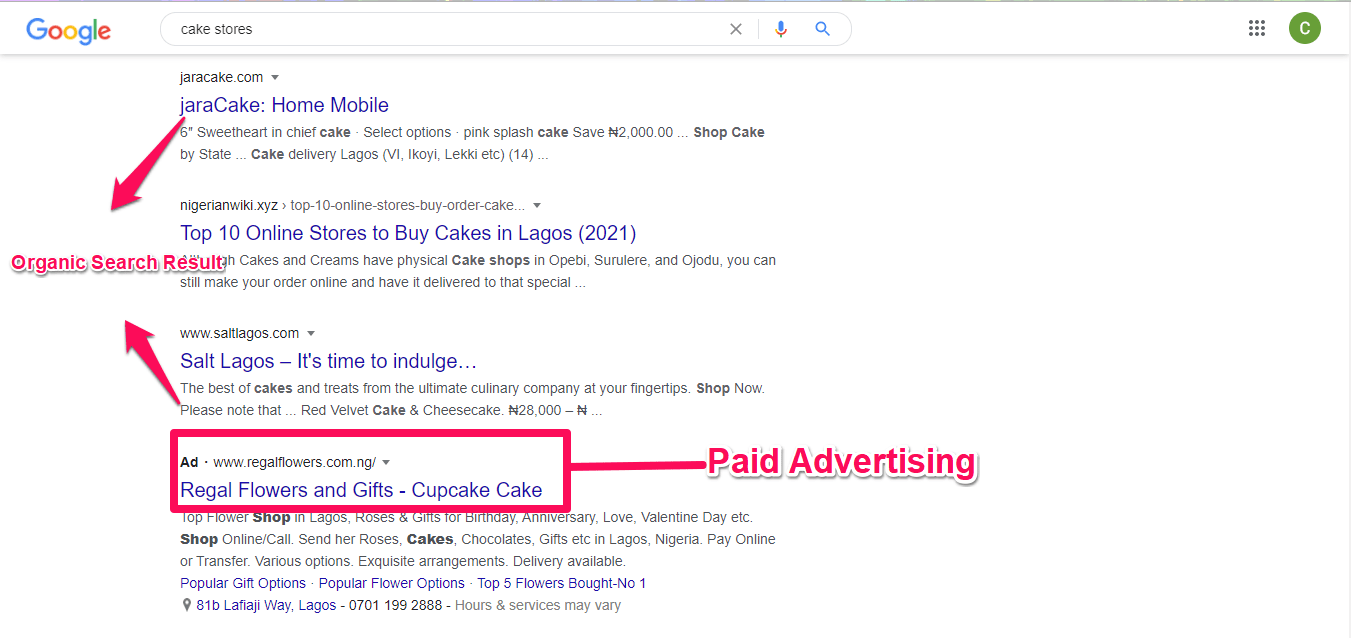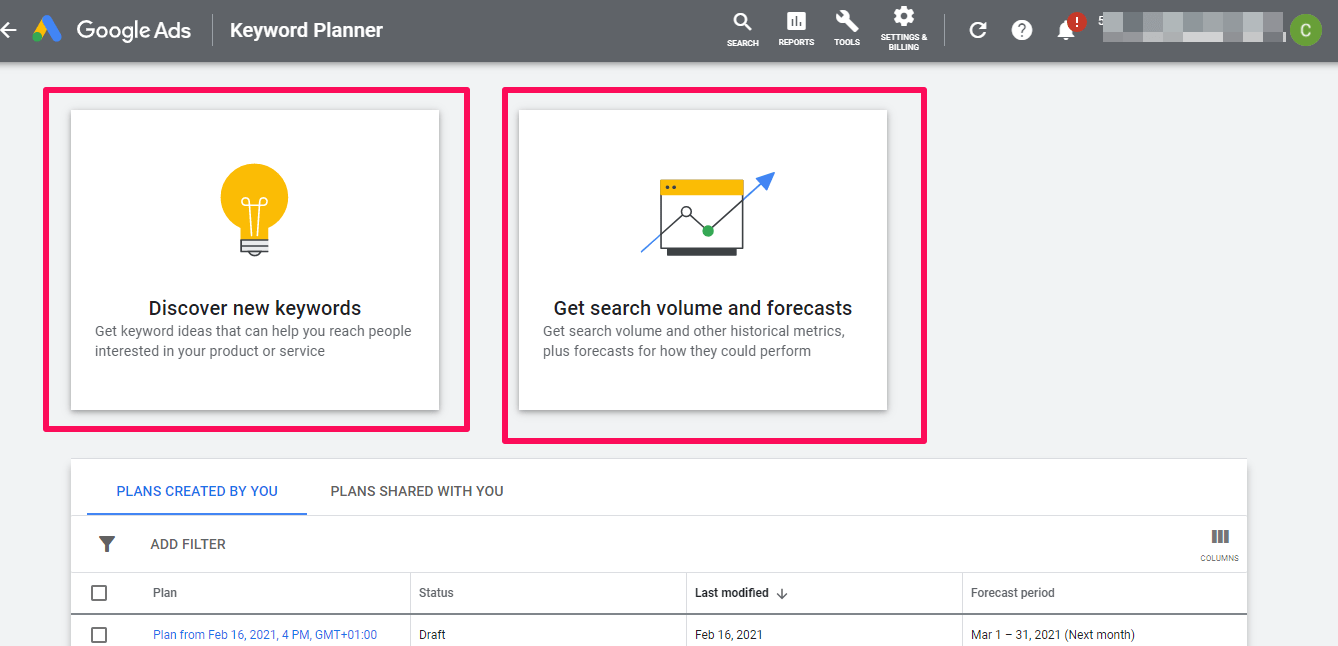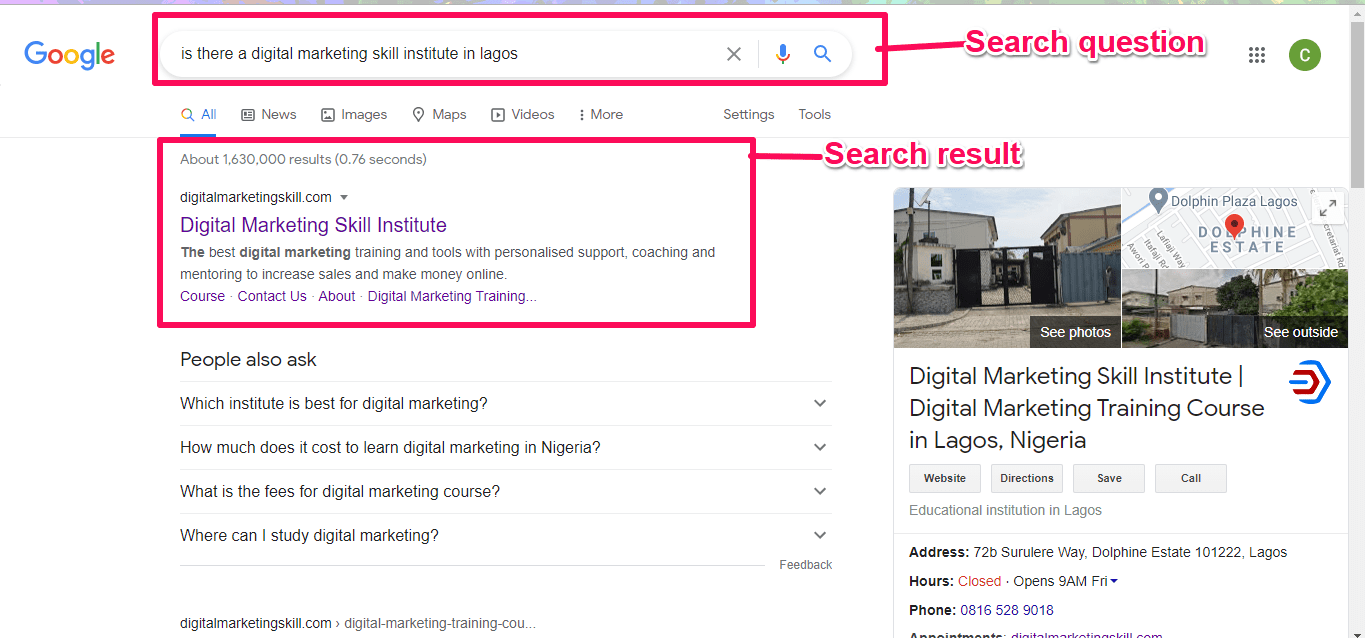The existence and growth of a business are highly dependent on how well the marketing strategies are well utilized. Search Engine Optimization is one of the tools that make this possible.
Yes. You read the write thing.
Have you ever wondered how google functions so well, that each time you ask a question you get accurate or similar to accurate answers and then you wonder, is there someone working in the backend?
Or maybe you thought your time zone is different from the timezone of the person running the backend and that’s why you always get a response each time you ask questions on google.
The time zone might be different but what is actually responsible for this is Search Engine Optimization.
In this article, we will be sharing what you need to know about Search Engine Optimization and how to go about it for your business or brand.
Moving forward, Search Engine Optimization is one effective tool in digital marketing. You know, there is no way you would mention digital marketing that you will ignore SEO and there is also no way for you to talk about SEO without talking about digital marketing. They are inseparable.
In light of this, let’s talk about digital marketing and how it relates to search engine optimization before getting started with SEO itself.
What is Digital Marketing?
Digital marketing is a system of marketing that utilizes the internet, mobile phones, social media, search engines, and other channels to promote products and services.
A small number of marketing experts believe that digital marketing is an entirely new endeavor that requires a new way to approach
customers and new ways of understanding how customers relate compared to traditional marketing.
Digital Marketing is different from internet marketing in the sense that digital marketing includes search results ads, email ads, and promoted tweets and can take place through mobile devices, on a subway platform, in a video game, or via a smartphone app while internet marketing is advertising that is solely on the internet.
There are a good number of Digital Marketing subjects that sum it up, these subjects are the necessary ingredients to have a good and effective digital marketing experience. One of them is Search Engine Optimization.
Search Engine Optimization plays a giant role in digital marketing, it helps to create brand awareness and promote businesses beyond geographical locations. This brings us to what is search engine optimization.
Get 50% Discount to Master ALL Aspects of Digital Marketing That Can Earn You $2,500 - $5,000 a month (Even if you are a complete beginner!)
Our students that intentionally implement what they learn from our digital marketing course make back the entire course fee within a single month or more after completing our course because our course gives them many income generating options with unlimited earning potential with no age or location barrier. The best part is no technical skills are required.
An opportunity to change your lifestyle and make money working from anywhere in the world. The results our students get from our digital marketing course prove this could be applied to any market or country and that it is designed for any skill level and work background.
*By signing up, you agree to our privacy policy and terms of service.
Meanwhile, our 90% practical digital marketing course offers you everything you need to know to be a digital marketer. All you have to do is to register and you are in.
Read more about digital marketing here What is Digital Marketing?
What is Search Engine Optimization?
Search Engine Optimization is also known as SEO, is the procedure put in place to improve the quality and quantity of website traffic to a web page or a website through organic search.
Organic search is the search results of a search engine that cannot be influenced by paid advertising. They are ranked according to their relevance to the searched term and they do not include adverts.

An example of organic search results and paid advertising. Source: Google
It can also be said to be the processes involved in improving your site to increase its visibility for relevant searches for internet users.
[bctt tweet=”The better visibility a page has in search results, the more likely the page is to get attention and attract existing and prospective customers to the brand/ business.” username=”dmsinstitute”]
In a layman’s language, SEO is the actions you take to optimize the online presence of your brand/business so that a search engine likes to show it as a top result for searches of a certain keyword by internet users.
[bctt tweet=”SEO is about understanding what people are searching for online, the answers they are seeking, the words they are using to search and the type of content they wish to consume.” username=”dmsinstitute”]
Knowledge of the answers to these questions will allow you to connect to the people who are searching for the solutions. To optimize the search engine, there are search engines.
What is a search engine?
A Search Engine is a web-based tool that enables users to locate information on the World Wide Web.
They scour billions of pieces of content from brands and businesses and evaluate thousands of factors to determine which content is most likely to answer a user’s query.
They do this by discovering and cataloging all available content on the internet in form of web pages, PDFs, images, videos, and others through a process called crawling and indexing and then ordering it by how well it matches the query in a process that is referred to as ranking.
One would ask, why is SEO so important, and why the fuss over it in digital marketing?
Why is SEO Important?
One of the importance of optimizing your content on the internet is to increase the visibility of your content, your brand, and your business, just like I said earlier in this article.
It pushes you out to the world and spreads the gospel of your content. If it was something that wasn’t necessary, there would be no need for it but because it has a stronghold on the digital market, this is the reason why there is so much fuss around it.
If you are interested in growing any business or corporate organization with digital marketing, then SEO is the right tool for you. It sure increases your visibility and more visibility leads to more engagements and later results in growth.
Another reason to consider SEO is that while preparing your web pages and content, you take more time to create great content that would ultimately improve user experience. And SEO helps you to showcase that amazing content to intent users who need it.
It also gives you authority. Authority in the sense that your website and content are of high quality, relevant and trustworthy. Once your site has more authority, your ranking gets higher because users can trust your brand.
Basically, SEO drives traffic to the online presence of your brand.
Another question to ask is How does SEO work?
How does SEO work?
Search engine functions in three dimensions, namely crawling, indexing and ranking.
Crawling
It has to do with scouring the internet. Like a baby who crawls either in search of the mother or in search of his/her toys is the same way search engines crawls through the internet searching for web pages to rank in search results.
These search engines discover updated content on the web, such as new sites or pages, changes to existing sites, and dead links. They use a program that can be referred to as a ‘crawler’, ‘bot’ depending on the type of search engine.
This program follows an algorithm process to determine the sites to crawl and how often it will crawl. A search engine moving through your site detects and records any links it finds on these pages and adds them to a list that will be crawled later.
And this is how new content is being discovered. As much as the crawler is meant to crawl to discover new content on your webpage, there are still common mistakes that would hinder the crawler from getting access to the other pages of your site.
It is necessary to make sure that the search engines can discover all the content you want to be indexed and not just your homepage. Common mistakes like;
- Hiding contents behind your login form. Protected contents behind these login forms cannot be
accessed by search engines. - Relying on search forms.
- Hidden text within a non-text content area. Text content should not be hidden behind non-text
content like images, videos, and gifs. Except for alt text, alt text is a text description of media files.
Avoiding these mistakes is one way to get the best out of search engine optimization.
Indexing
It is the process of storing and organizing contents found during the crawling process. A compilation of a massive index of all the words it sees and their locations on each page.
This extracted content is being stored in a huge database and the information is organized and interpreted by the search engine’s algorithm to measure its importance compared to similar pages.
The moment a page in the index is ready to be displayed as a result of relevant queries. Servers in different parts of the world allow users to access these pages almost immediately.
If a website or a landing page is not in a search engine’s index, internet users won’t be able to find it. Another reason why you must pay close attention to search engine optimization as a whole.
Ranking
It allows you to show clients and users tangible progress.
When you input a keyword into a search box (as shown in the image below), search engines immediately scan their index for pages closely matching the keyword. These pages receive a score determined by an algorithm comprising hundreds of diverse ranking signals.
These webpages will then be displayed to the internet user in order of score.
For your webpage to rank well in search results pages, it is vital to make sure search engines can crawl and index your site correctly, otherwise, the search engines will be unable to appropriately rank your webpages in search results.
You can aid the ranking of your webpages by using backlinks, HTML tags, Core web vitals, user behaviors, structured data, google my business, mobile optimization, and many more. Ranking helps to drive webpage traffic.
Key factors of Search Engine Optimization
On-Page SEO
This is another aspect of search engine optimization that points at the factors you can control on your websites. It is also the practice of optimizing web page content for search engines and users.
Some of the on-page SEO practices include optimizing title tags, content, internal links, and URLs. You optimize your content for user experience, search intent, page loading speed, click-through rate, and bounce rate, and dwell time.
On-page SEO permits you to turn your research into content that would satisfy your audience and of course drive visibility. Avoid creating content to rank highly in search alone.
The end of this whole thing is to provide internet users with the help they need. Don’t fall into the trap of low-value content.
Off-page SEO
If there is an ON button there would definitely be an OFF button.
Off-Page has to do with the activities that take place off a website in a bid to enhance the site’s search engine rankings. The common activities include building backlinks, encouraging branded searches, and increasing engagement and shares across social
media.
Off-Page can be seen as all the stuff that is done off your website to get search engines like Google and others to see your websites as trustworthy and authoritative.
The difference between these two is that On-page is everything that can be directly controlled on your website, including content, keyword usage, title tags, SEO-optimized URLs, internal links, and image alt text while Off-page SEO are activities that happen far away from your website like links and mentions on other websites.
Technical SEO
Just like the name implies, is the technical aspect of Search Engine optimization. It has to do with understanding that your crafted valuable content is not only readable by humans but by search engines too.
Technical SEO is how crawling, indexing and ranking takes place.
Bearing in mind that search engines are computer inclined and to get them to carry out our desire, we need to make provisions for them to easily read our valuable content.
You don’t need to have a deep technical understanding of these concepts, but it is important to understand what these technical assets do to be able to speak intelligently about them with developers.
The developer cannot understand if you can’t communicate with them and it is important because you will need them to carry out some of the optimizations for you.
If they can’t understand your request, they likely won’t be able to prioritize your request and also see the importance.
Having established trust and credibility with your developer, you can sleep with your eyes closed knowing that crucial work will be carried out.
Amazing Tips on How To Get the Best Out of Search Engine Optimization
1. Create quality content
Content, as information and experience directed to an audience, serves the purpose of conveying a story with the singular goal of engaging the audience.
The relationship between content and SEO is a love affair and so they always work together. If a webpage does not have content on it, then SEO is useless and cannot even exist.
Content is more than words, there is video content, images, and many more. The search engine is the messenger and contents is the message it shares.
To ensure the messenger conveys the intended message to the right audience, structure the message effectively to impart the desired knowledge. The key lies in presenting your information clearly and engagingly, in a way that easily facilitate understanding.
Your content should be compelling and useful to influence your website more than any other thing. Search engines and internet users know good content when they see it and will likely want to direct other users to it.
Sometimes, it could be through blog posts, social media engagement, email, forums, or other means. Organic or users recommendation is what helps to build your site’s reputation with users and it rarely comes without quality content. Users also enjoy well-crafted content.
Basically, your content drives profitable customer and client action, and so you have to create great and quality content.
2. Keyword research
One of the things that search engine optimization thrives on is keywords. And a good way to get these keywords is through keyword research.
A better understanding of your target market and how they are searching for your content, services, or products will help you do proper keyword research.
To do keyword research, you must be on the lookout for answers to some questions as this will help you to properly structure your keyword research.
Questions like; What are the internet users searching for? How many internet users are searching for it? what format do they want the information in?
To help a business get optimized, there is a need to ask questions that will make you understand the identity of the brand, their goals, and who their customers are.
Avoid misrepresenting your brand online. As the business owner gearing up for optimization, ensure you have answers to these critical questions.
The answers will aid keyword research because you will know what to look for. You might want to group the keywords you researched into keywords by the competitor, keywords by season, and keywords by region.
Keywords by a competitor; you need to know the keywords your competitor is currently ranking for and prioritize them. It would be helpful if you want to take advantage of your competitor’s missed opportunity.
Keywords by season; seasons like Christmas, valentine, winter, you can schedule your keywords to fit into the season.
Keywords by region; you can identify your specific region and narrow them down to specific cities and towns and create keywords around there to promote content visibility.

Google keyword planner is a good tool for keyword research.
3. Research your niche
To successfully fulfill the obligations of SEO, you need to have sound knowledge of your niche. This way you would know how to provide answers in form of content that search engines can optimize.
You don’t want to provide wrong answers to your audience and end up jeopardizing the brand/business you are currently building and growing.
Moreover, if the answers you provide don’t answer the question searched for, search engines will not crawl your website not to talk of ranking it.
4. Image optimization
Images are important in ensuring that internet users find your website attractive and appealing enough to want to engage it.
Remember, search engines crawl content, and your image is visual content—so optimizing it is crucial for crawling and ranking your website. Ensure your image is well-optimized to enhance search engine visibility and improve your site’s ranking.
Optimized images also speed up your page loading, and this increases user engagements and search engine ranking.
You can optimize images by following these steps;
- Resizing your images. Dimensions of an image differ for different use. The dimension for a printed image is different from the one your website should have. If your website has a higher dimension, it will slow down your page.
- Optimize image file names. When an image prominently features a specific keyword, search engines like Google take notice, capturing attention and indexing it for future ranking.
- Include captions.
- Use unique images that clearly describe the message you want to pass across.
5. Build backlinks
Crafting that sought-after content, tackling questions, and making it search engine-friendly is just the start. But it doesn’t ensure a high rank. Now, you must take action beyond creation to secure that coveted spot in the rankings.
If you want to outrank your competitors, you need to establish authority. You can establish authority by earning links from authoritative websites, building your brand, and nurturing an audience who will amplify your content.
With confirmation from Google, links and quality content are two of the three most important ranking factors for SEO. Inbound links that can also be said to be external are HTML hyperlinks that point from one website to the other.
They act like a real-life recommendation. Links send qualified traffic to your site so it is important to acquire links from relevant websites that have an audience who would find value in your site.
While trying to build your link, don’t ever try to manipulate a site’s ranking in search results.
Earn your links – make them authoritative, let them grow over time, source them from relevant places, drive quality traffic, blend the follow and no-follow wisely, target strategically, and earn them organically.
If you want to build high-quality backlinks, you should consider the following;
- Finding customers and partner links.
- Publishing a blog.
- Create unique resources.
- Build resource pages. Be intentional about giving quality resources.
- Get involved in your local community. Build your network.
- Refurbish top contents that you have published before.
- Be newsworthy. Getting the attention of the press, bloggers, and news media increase your
chances of earning links. - Be genuine and personal. Ensure your contents are genuine.
6. Analyze your results
The next aspect of SEO to consider is analyzing your results. By analyzing your results, you get to track your performance and see what to improve and how to improve. “If you can measure something, you can improve it”, which means as long as it is measurable, there is room for improvement.
When assessing the impact of your work, rate your success and contemplate ways to enhance it for greater success.
It will also help you to discover what is not working out and why it is not working out.
When embarking on your SEO journey, whether as a professional pursuit or for your personal business, kick things off with a clear vision of the end goal. It’s wise to begin with the end in mind.
Have a fictional end in mind because it will guide your actions to accomplish one specific primary end goal that you must have created.
7. Don’t ignore technical SEO
Crafting a well-designed website is not a magic—it required significant effort behind the scenes. This process, known as backend development, involved a lot of hard work and dedication.
Technical SEO is the backend of search engine optimization.
Technical SEO is the process of ensuring that a website meets the technical requirements of modern search engines with the goal of improved organic rankings.
To maximize your results in search engine optimization, you must incorporate technical SEO. Ignoring it is not an option if you aim to achieve your SEO goals effectively.
Technical SEO has to do with,
1. Domain specification
2. Navigation and structure of your site
3. Website speed
4. Mobile-friendliness
5. And every activity implemented to ensure search engines can rank your websites in search results.
8. Have SEO goals
Don’t just try every form or aspect of SEO at once for a brand, having SEO goals will guide you to making the best out of it. Definitely, you must have business goals, marketing goals as well as what you intend to achieve with SEO.
A goal is an idea of the future or desired result that a person or a group of people envision, plan and commit to achieving. SEO goals are the ideas of the future or desired result that you want SEO to achieve for your brand/corporate organizations.
Your SEO goals could be to increase backlinks, while another brand’s goals could be to strengthen domain authority. Obviously, these goals are different the same way the process and procedures to achieving them will be different.
What works for Brand A might not work for brand F, which is why you need to have your search engine optimization goals well-drafted out, planned, and followed through.
9. Keep learning and repeat
Learning never ends especially for a technologically inclined topic like search engine optimization.
Every day, developers create new software and establish new processes.
Search engines follow programmed algorithms. Regularly update your SEO methods as software evolves with differing updates of the algorithms. Yesterday’s knowledge might not yield desired outcomes tomorrow.
Conclusion
Search engine optimization is very vital in digital marketing. As you know, digital marketing has made it possible for business transactions to take place beyond geographical locations.
And a good way to successfully achieve that is to optimize the search engines that exist. When you involve search engine optimization for the digital existence of your business, you are on the path to growing and growing as it will expose your brand/business to a wider audience.
In our 90% practical digital marketing course, we teach our students how to carry out search engine optimization alongside other features in digital marketing.
We have Intelligent and proficient coaches who teach and monitor the students to ensure they follow through the process and achieve their desired outcome.
You can register here. Digital Marketing Course
Other articles on search engine optimization
Search Engine Optimization (SEO) | A Complete Beginner’s Guide To Website Ranking
30 Fast Ways To Increase Website Traffic For Free
Digital Marketing Defined: 9 Amazing Ways to Make Money Online + Proof
SEO Writing for Beginners: A Step-By-Step Guide to SEO Copywriting



